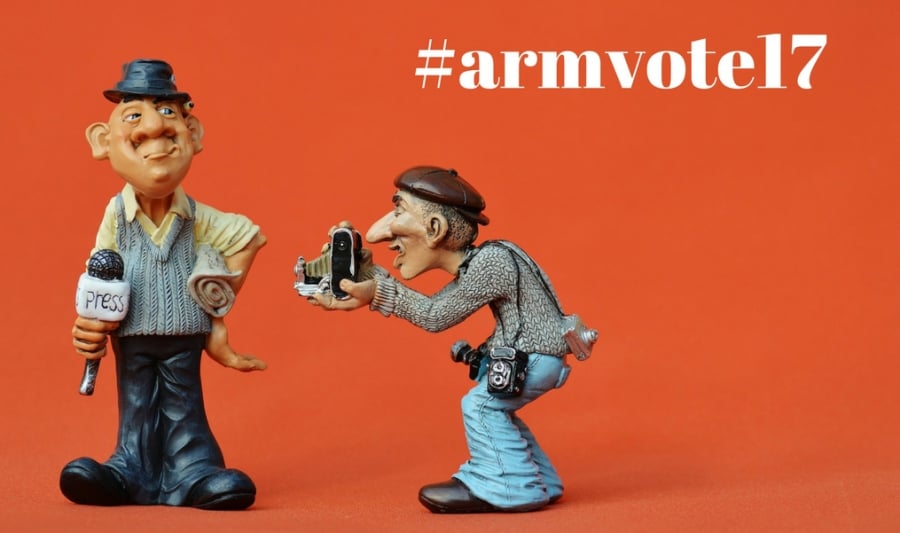Journalists are important actors in the election campaign. In a matter of four weeks, they are present at the dozen meetings and rallies of various political parties.
Tert.am journalist Nelly Lazaryan and Armtimes.com journalist Tirayr Muradyan have been working in ‘emergency mode’ during this past month, following the election campaign in Yerevan and in the regions, sometimes working late into the night.
Our colleagues shared with Media.am their work-related impressions of the 2017 parliamentary election campaign.
Nelly Lazaryan
Working as a political journalist at Tert.am since 2011. A more intense campaign than during the previous elections was expected.

The election campaign period did not stand out at all with heated campaigning; in many cases it was even boring. After speeches by a few political groups, at all other meetings the same words were heard.
In previous elections, the forces apart from the ruling authorities representing the opposition came out with sharp criticism against each other, but during these elections, for a long time it seems they left space, likely considering future cooperation likely. Only in the last week was criticism by one opposition group against another a little noticeable.
With the exception of a few gatherings, particularly by the Tsarukyan alliance, this campaign wasn’t held in crowded public squares; it was more so in indoor halls, especially in the case of the HHK [Republican Party of Armenia], which was accompanied by question-and-answer periods and mainly led only by Prime Minister Karen Karapetyan.
The ruling HHK’s team, unlike in previous campaigns, almost did not take part in the campaigns.
Meanwhile, in the last elections, the notable HHK figures wearing red scarves with the slogan “Let’s believe, to change” and led by the president met with thousands of voters.
There weren’t many intrigues in this election, though the prime minister’s campaign was more unconstrained. Meanwhile, in the last election, though the president’s campaign was more tightly controlled, there were serious bloopers, such as “that’s why a cucumber grows crooked,” “we’ll strike as much as we want,” and so on.
Many of the political groups, as well as many of the individual candidates used Facebook a lot during these elections — and overestimated its possibilities a little bit, since real life differs from the Facebook reality.
More interesting in this election were the campaigns of some of the individual candidates, though they were trying as much as possible to conduct them without the presence of journalists.
Journalists found it difficult to know where the candidate was and what time he was going to meet with voters.
Especially surprising for me was the extreme passivity of the campaign in Gyumri, in that case when there were close to 110 candidates nominated from there. For example, Vardan Ghukasyan didn’t have a [campaign] poster in the city at all and hadn’t held any meetings separately with voters. He explained that he “doesn’t go out so not to get framed.” A little bit active here was Martun Grigoryan, who met with voters in indoor conditions.
Large-scale asphalting projects also didn’t happen during these elections. Which, by the way, didn’t please the voters. They’re disappointed that there weren’t any promises.
Tirayr Muradyan
Works at Armtimes.com. During the campaign period, he managed to cover the events of up to 3 political parties a day. In his opinion, the campaign process was very dynamic and saturated.

There were no political debates in media outlets during this period; the ruling political party avoided responding to sharp statements other parties directed at it. For example, when HAK [Armenian National Congress] leader Levon Ter-Petrossian was putting forth his thesis on the settlement of the Karabakh conflict, which crosses with the HHK [Republican Party of Armenia] program, the latter didn’t comment in any way.
There were few times, for example in HHK’s case, when I had the opportunity to ask Karen Karapetyan questions. I was present at more than 10 meetings, and during that time two or three times I’ve asked him a question, and his answer lasted three minutes at best.
Tsarukyan’s campaign was dynamic; I wanted to cover it more, but it didn’t work out because of [limited] resources. This alliance and other political forces, having a certain suite of media outlets, got their wanted remarks to the electorate. For this reason, many journalists were deprived of the opportunity to ask questions regarding the points of their program or other issues.
The coverage of the individual candidates was hard, since there are 13 precincts, with 10–15 representatives from each party or alliance. If any media outlet really wanted to cover all the candidates in one precinct at least once, I don’t think its resources would allow it.
In my case, I covered candidates who actively broke the law, were in funny situations, and were interesting for the public. Social media helped the other candidates: candidates created videos about themselves, shared them, and were satisfied with their campaign.
I mainly placed importance on the question-and-answer; I noticed there weren’t any sharp questions in the ruling Republican’s case. This format occurred with the ARF-D [Armenian Revolutionary Federation] and the other opposition groups, since they had more of an issue establishing contact and presenting their programs.
I was attentive to electoral violations at gatherings, especially campaigning, attempts at bribes, and so on in non-designated areas.
The standard circuit of questions at HHK’s meetings was boring. I don’t think it was intentional, but it referred to that bloc about which the prime minister could talk for hours.
There was always a humorous incident at almost all of Tsarukyan’s meetings. At all his campaign meetings, I didn’t turn off my camera at all: someone would be bowing at his feet; he would hug someone and pick them up; with someone else, he would arm wrestle; and so on.
Also among the series of funny incidents was when at [MP] Arakel Movsisyan’s meeting with parents and teachers at Tairov village school, one of the teachers stood up and said there’s a journalist in the room, for which they are happy. This way, the teacher informed Movsisyan that I’m there. The meeting lasted only 10 minutes.
Gayane Asryan







